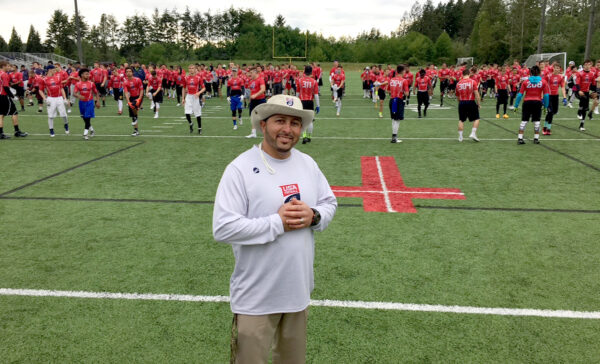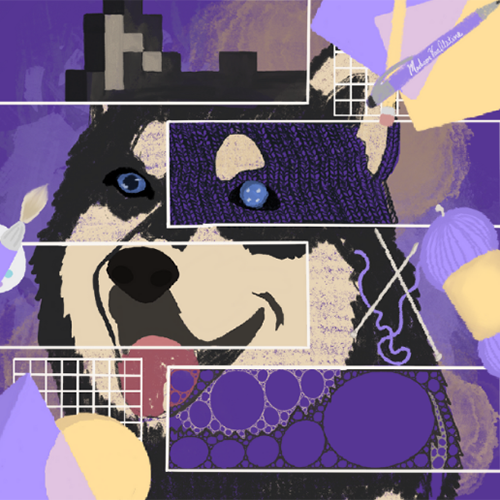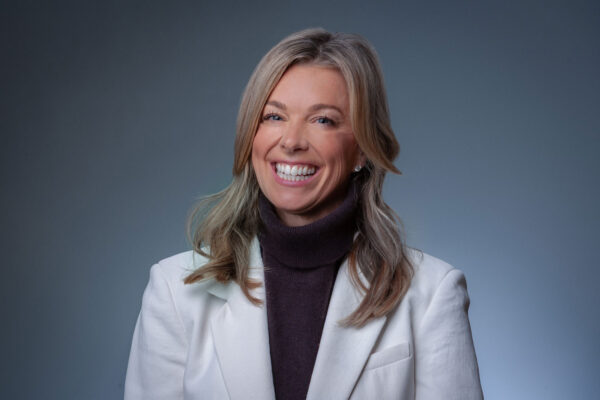When Cynthia Anderson first came to the University of Washington, she was a transfer student who expected to be gone in two years. Instead, she has stayed for nearly 20, earning a bachelor’s degree in Comparative History of Ideas at UW Seattle (2004), earning a master’s degree in Cultural Studies at UW Bothell (2023) and working in the CHID program, first as an academic adviser and now as the director of Learning Communities.
“I have had a breadth of experiences at UW,” Anderson said, “and these experiences have shaped the work I do and how I move through this world as the person I am today.”
The University was shaped by Anderson, too. As an undergraduate student, she helped to create and facilitate a 200-level course. And as a staff member,” said Dr. Anu Taranath, teaching professor in CHID and the Department of English, she has been “a powerful advocate for BIPOC students, staff and faculty across the UW.”
In recognition of all that Anderson has contributed to the UW, she has been named a Husky 100 honoree. Each year, the UW recognizes 100 undergraduate and graduate students from the Bothell, Seattle and Tacoma campuses who are making the most of their time at the University. The recipients actively connect what happens inside and outside of the classroom, applying what they learn to make a difference on campus and in community. Anderson is one of eight students from UW Bothell recognized in 2023.
Strength in differences, not similarities
Anderson’s college journey started in 2004 when she was accepted into the Comparative History of Ideas program at the UW in Seattle. “The major encourages students to study topics they feel most passionate about and to not only reflect on what they know but how they know it and how it influences the ways in which they navigate the world,” Anderson said.
This felt like the perfect program for Anderson who, at the time, was trying to make sense of her own lived experiences as a Pakistani adoptee. She took courses that “challenged students to investigate the meanings of race, gender, class, sexuality and other social differences — and discuss how ideas about differences and diversity play out in society, on campus and in our own lives,” she explained.
Her interest in these topics and her passion for diversity and equity were noticed by Dr. Jeanette Bushnell, a part time-lecturer in CHID who invited Anderson even as a student to co-create and co-facilitate a 200-level CHID course titled (Re)Thinking Diversity.
“I feel fortunate to have been a part of creating that class and humbled that it continues to be taught. It pushes students to reflect on their own diversity stories,” she said. “It is one of my proudest accomplishments at the UW.”
Sharing knowledge and expertise
Upon receiving her bachelor’s degree in 2006, Anderson accepted a position as an academic adviser for CHID, where she has now dedicated nearly 18 years to supporting students. Through this role, Anderson has helped thousands of undergraduates navigate higher education — a challenge she is familiar with as she was the first in her family to graduate with a four-year college degree.
“I remember being told by a high school guidance counselor that since there was no one in my family who had attended a four-year college, she didn’t think I needed to apply,” Anderson recalled. “I think back to that comment often when meeting with students. I know that my words have a great impact on them, and so I choose them carefully.
“My hope,” she said, “is to inspire others to follow their interests, to help them articulate what they are passionate about and to [have students] leave my office connected with at least two people who can support them.”
In a letter of endorsement for the Husky 100 honor, Taranath wrote of Anderson, “While I have certainly been impressed by Cynthia’s professionalism and vast knowledge of university structures and procedures — I have been absolutely gob smacked by her commitment to the students in CHID and their experiences as humans in the world.
“For more than a decade, Cynthia has led CHID by her care, compassion and collegiality with students, staff and faculty across the department. She has been a tremendous gift.”
I remember being told by a high school guidance counselor that since there was no one in my family who had attended a four-year college, she didn’t think I needed to apply. I think back to that comment often when meeting with students. I know that my words have great impact on them, and so I choose them carefully.
Cynthia Anderson, 2004 and 2023 alumna
Passion meets important purpose
As an academic adviser, Anderson also co-instructed study abroad programs to Chile, Germany and Ghana. “Being involved in global education opportunities with students has been truly humbling and has taught me the importance of slowing down, actively listening and being present when traveling,” she said. “It is such a privilege to be able to participate in global education, so being reflective through coursework and conversation is an important factor in the experience.”
Anderson continued her own learning, too, inspired by working so closely with students for so many years. In 2021, she came to UW Bothell to pursue a master’s degree in Cultural Studies. She took a full load of courses while also holding down a full-time job and raising two children with her husband.
Her master’s thesis was based on a personal experience: As a brown woman who experienced trauma when giving birth, Anderson felt the call to push for justice and equity in health care.
“Current systems of care do not adequately understand how to offer trauma-informed and culturally congruent care before, during and after the birthing process,” she said. “This is seen in the disproportionately high death rates of mothers and babies of color during labor and delivery.”
Data-driven research and solutions
Anderson points to data from the Centers for Disease Control and Prevention, which indicate that these numbers are due to four main factors: variations in health care quality, underlying chronic conditions, structural racism and implicit bias. Her graduate-level research focused on the need to build more equitable and inclusive spaces, including offering culturally appropriate midwife and doula care. The National Health Law Program, she noted, promotes these as cost-effective tools to improve maternal health outcomes and reduce racial disparities.
“There is so much work to be done to change the experiences Black and brown people have when we access care in medical spaces,” she said.
Committed to making a difference in the health care system, Anderson plans to continue asking critical questions around equity for birthing people of color, to engage in advocacy with and for doulas and midwives — specifically around hiring and retaining of people of color in these roles — and to work with hospital boards and medical facilities to push for culturally congruent care in labor, birth and delivery.
“I am grateful for the experiences that the UW has offered me to grow and forge new roots, Anderson said, looking back on the past 20 years. “I have learned to stay curious and to understand that my education has not just been about learning how to ask the right questions — it’s also about being humble enough to listen and learn from others.”



